When I Was a Little Guy
By Andrew Looney
My brother Richard goes by the nickname Rash,
and is about ten years older than me. One day, he dropped out
of college and moved out of the house. After a few years in the
job market and on the road, he decided to move back in and finish
up college. (We live less than a mile from the University.)
This was in July of 1978; I was fourteen years old, about to
start the tenth grade. We had gone on a trip somewhere, and when
we returned, there he was, quietly nestled in the unused basement
room.
Now, up to this point in my life, I really didn't know Rash
very well. I have three older brothers, all much older than me.
When I was growing up, they were more like Uncles than siblings:
Mysterious, yet friendly, they were Big Guys. I looked up to them,
but I didn't understand them.
When Rash moved back in, I noticed something strange. He treated
me like an adult, rather than a child. Somehow, in the few short
years that he lived elsewhere, I had grown up.
Richard lived at home for 15 months. During that year, he and
I became quite close. Before that time, he was almost a stranger,
a person I found fascinating, but knew little about. In those
months, I learned much about him, and many of his interests and
philosophies rubbed off on me. I often reflect upon that year
as being one of the great times of my life.
I lived on the top floor of our house, an average size brick
house in a middle class suburb of Washington D.C. It was like
my own little apartment up there; I was the only one living on
that floor, and I had my own bathroom and everything. There was
one other bedroom, but it belonged to Jeff, who was off at Princeton
studying history, and rarely used it. My sister and parents lived
on the ground floor, and Rash lived in the basement room, an enclosed
section of the basement originally constructed by Dad as a study.
I encountered Rash several times each day. The first came sometime
after school. In those days I usually did my homework as soon
as I got home, since it wasn't that hard and I wanted to get it
out of the way. Besides, I had to stay in my room and prepare
for battle.
Rash always took his bath as soon as he got home, and he chose
to use my bathroom rather than the one downstairs. This always
led to conflict. He would bound up the stairs and lock himself
in, despite my efforts to keep him out and force him to use the
downstairs bathroom. I always lost this phase of the battle.
I would sit at my desk, pretending to work, listening to him
take his bath. He referred to his bath as his "Daily Water".
He made a lot of noise when he took his Water; apart from the
splashing, he would sing silly songs, and shout various remarks
through the walls at me. And he would laugh - a sort of a "he-he-he"
laugh, like the evil snicker of the chief Blue Meanie in the movie
"Yellow Submarine". I listened to these sounds as they
drifted through the walls, all the while planning my defense.
Sometimes, we'd have an actual conversation, or at least as much
of one as two people can have when they are separated by a wall.
And suddenly the bathroom door would burst open, and my brother
would rush into my room, laughing maniacally and wearing only
a pair of shorts. He would attempt to hurl himself onto my bed.
When he succeeded, which was most of the time, he would roll back
and forth beneath my blankets until he was dry. This was an action
that he called "The Drying Process". I always tried
to prevent it, by striking him with pillows, and threatening him
with more lethal weapons, but these efforts were almost always
in vain.
In those days, I was very interested in Medieval history, and
was involved with a group that performed re-creations of famous
battles of the Middle Ages. I had a full
costume, including a shirt of chain mail armour that I had
made myself, and a collection of deadly medieval weapons; a sword,
mace, battleaxe, and so forth. For a while, I tried dressing in
my battle gear while Richard took his Water, and when he emerged,
I'd be quite a fearsome opponent. But I couldn't actually strike
him with my weaponry, and so he often managed to slip through
my defenses and engage in Drying.
He refered to this area of my interest as "Merry Tune
Singing." When my friends and I left for a battle re-enactment,
he would say, "There they go, marching into battle, Singing
a Merry Tune." He would parade about, lifting up one of my
weapons and brandishing it in the air, singing, "Let's sing
a Merry Tune," to the tune of the theme music from the film
"The Lord of the Rings."
At dinner, he sat to my left. Richard is a very funny guy,
and I laughed many times during the course of a meal (or any conversation
with him, for that matter). Now, as most people know, anything
that is funny is much more funny when your mouth is full. This
became quite a problem for me in those days. I would be drinking
a glass of lemonade, and he would say something, and it would
make me laugh. Sometimes it was just the way he said it. In a
situation like this I had no option but to put the liquid that
was in my mouth back into my cup. Naturally this was quite embarrassing.
That year for Christmas, the label on the present from Rash to
me read, "To: The Man Who Laughs Into Cups, From: The Future
People."
In the course of time, I learned a valuable skill: laughing
with my mouth full. Unless the joke is really funny, I can hold
a mouthful of liquid and laugh at the same time.
When laughing into cups became less frequent, Rash devised
another method of causing mealtime trauma. He would wait until
my cup met my lips, and then nudge my elbow, ever so slighly.
This always resulted in a soggy shirt and a laughing brother.
Our father had very little patience with this sort of behavior,
and sometimes became furious at our dinnertime hi-jinx.
I saw little of Rash in the evenings. He, being a college student,
had studying to do. But at about 10:45 each night, we would both
head towards the kitchen, to prepare for the Late Night Viewing.
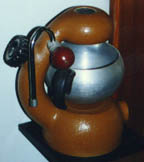 Rash had this alien machine. It was about
a foot tall, and sat on a burner on the top of the stove. It was
painted brown, and was curved and rounded, with several knobs
and levers. He used it to make espresso. The brand name of the
machine, written on a small disk set into the top of the thing,
was "Atomic".
Rash had this alien machine. It was about
a foot tall, and sat on a burner on the top of the stove. It was
painted brown, and was curved and rounded, with several knobs
and levers. He used it to make espresso. The brand name of the
machine, written on a small disk set into the top of the thing,
was "Atomic".
He took his coffee making very seriously. (He roasted the beans
himself, in a roaster he had made from a metal piece of plumbing
equipment.) The machine made loud hissing noises as it spat out
the coffee. It also shot out jets of steam, which he used to warm
up the milk that went into his espresso. In the mornings he drank
coffee, but at night he used the heated milk to make his own type
of hot chocolate. I would enter the kitchen to find him hunkered
over his espresso machine, like a mad scientist adjusting the
knobs on a piece of sinister laboratory equipment.
But I had my own preparations to perform. My midnight snack
consisted of a cup of properly cooled hot chocolate and a mug
of instant macaroni and cheese. The latter was a product manufactured
by Betty Crocker, called "Mug-o-Lunch". It was a wonderful,
convenient food product. "Make in a mug in 5 min." the
box proclaimed, "Just add boiling water." The easy directions
on the back of the box even called themselves "EASY DIRECTIONS".
But in addition to the simple preparation, it made a very tasty
snack. I will never understand why it didn't catch on.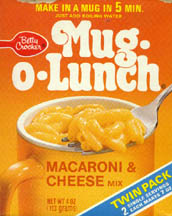
My hot chocolate was also made from
an instant mix. (I was a strong advocate of the "just add
boiling water" school of cooking in those days.) However,
I would add only half of the boiling water recommended in the
hot chocolate directions. I would add the water, and mix the stuff
up. Then I filled the cup to the top with milk. This gave the
instant cocoa a much richer quality, and also brought the fluid
to a drinkable temperature quickly. (If there's one thing I hate,
it's waiting around for hours while my hot chocolate cools down
enough that it won't scald off my tongue.)
Those late night preparations in the kitchen were always very
pleasant. We would jostle each other, good naturedly getting in
each other's way, as we concocted our snacks. The house was mostly
quiet by then, since our parents and sister were already in bed.
The kitchen was warm and cozy, lit by a single light bulb in an
old yellow lamp shade, which bathed the whole room in a comfortable
yellow glow. "But hurry up!" said the chiming grandfather
clock, "It's almost time!"
By 11:00 pm, we were in the Television room with our snacks
and the lights off. Eleven o'clock was when "The Twilight
Zone" came on, and we watched it faithfully every night.
We'd seen them all before, but we watched them again anyway. I
had this episode guide that I got out of "Starlog",
a science fiction fanzine, which listed all of the shows, with
credits and little synopses, and the order they were shown in.
The local reruns channel showed them in more or less the correct
order. Each night I would try to predict in advance which episode
would be on. I imagined myself a sorcerer with a crystal ball,
or a prophet, examining my charts and observing the alignment
of the stars, trying to guess what the future would bring. More
often than not, my guess was correct. But from time to time I
would predict a high quality episode, only to be presented with
a total loser. Rash was always quick to underscore the seriousness
of my mistake.
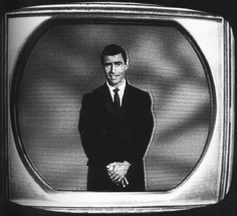 No talking was permitted during Rod Serling's
black and white half hour, at least when it was a good episode.
But some of the shows have not aged well at all, and some were
bad to begin with; in either of these cases laughter and heckling
were allowed.
No talking was permitted during Rod Serling's
black and white half hour, at least when it was a good episode.
But some of the shows have not aged well at all, and some were
bad to begin with; in either of these cases laughter and heckling
were allowed.
We would sit in the dark, huddled beneath blankets (in the
winter) while consuming our snacks. One problem with my Mug-o-Lunch
was that it required stirring, and when stirred it made a loud
slurping noise. This became another subject of ridicule from Rash,
who refered to the sounds as my "Toilet Noises". (He
seemed to think that these sounds were similar to those that emerge
from a bathroom when the toilet is in use.)
After the Zone came "The Benny Hill Show". This low
brow British comedy show was sometimes very entertaining, and
sometimes extremely boring. When it was boring, we would switch
over to the other rerun channel, which was showing "The Odd
Couple". The decision to change channels was often a point
of disagreement. We sat on stools up near the screen, and there
would sometimes be battles for control of the knob. Of course,
we would always switch over to Felix and Oscar during the commercials.
Commercials on late night T.V. are a real problem for the regularate
Night Viewer. They vary only slightly from night to night. It
gets to the point were you can tell what time it is by the ad
that is showing at a given moment. Among the commercials that
we developed a particular dislike for was a phone ad with the
refrain "Billpayer! Billpayer! Billpayer phone!" and
the Bartender's Academy ad with the unsuccessful bartender saying
to the founder of the school, "Say, aren't you Wayne Rodowsky,
of Bartender's Academy? I'm doing ok, I guess, but I'd be doing
a lot better, Mr. Rodowsky, had I gone to YOUR school." Another
featured a woman being told that the whiteners were being removed
from Final Touch fabric softener. "You put those whiteners
back in my Final Touch!" she objected. Later, when told that
the whiteners hadn't really been removed, she said "I'm glad,
I'm pleased, I'm tickled to death!"
The one commercial that we did like was the Dave Campo hard
sell car commercial. Dave would sell cars like a Television evangelist
sells Jesus. He would point to a car and shout "OH! Look
at this car right HERE! You give me forty nine dollars down, a
hundred forty nine dollars a month! Pick up the PHONE! Give us
a CALL!" Each night his rantings and ravings became funnier
and funnier.
At midnight, "Perry Mason" came on. Rash always tried
to get me to stick around and watch it, but it was an hour long,
and I was tired and I had school the next day, so I would usually
watch only the opening. Despite his urgings, I just couldn't get
interested in Perry. So I would say goodnight, climb the stairs
and go to sleep.
One night Rash told me to plan on staying up really late. After
the Zone, a film was being shown on the Late Movie that we were
going to watch. It was as if I had no choice in the matter. The
movie was "Fahrenheit 451", from the novel by Ray Bradbury.
It was, and I suppose it still is, Rash's favorite movie. It is
an excellent film, though I'm afraid I was too sleepy to enjoy
it fully at that time. On another evening, he made me watch "The
Illustrated Man," also based on a Bradbury book.
The main character of "Fahrenheit 451" is named Montag.
Not long after that night, Rash began to call me "Antag",
a sort of derivative translation of my real name, Andy, and Montag.
"Montag" is the German word for "Monday",
so "Antag" is German for "Andy" - sort of.
(The a's in "Antag" are pronounced "ah", as
in "stick out your tongue and say ah".)
So my nickname became Antag, just as his was Rash. That name
stuck, at least with him; He still calls me that. Just the other
day I got a postcard from him addressed to Antag.
Furthermore, a major philosophical point came up not long after
watching "Fahrenheit 451". In the film, Montag's wife
Linda is a ditz, a total airhead, whose sole activity is watching
Television. Rash refered to her as a "Tubehead", i.e.
one who watches the Tube too much. Rash explained that watching
too much Televison rots your brain. Of course, the only time either
of us watched the Tube was during the Late Night Viewing, and
we began to refer to anyone who watched more than a small amount
of TV as a Tubehead.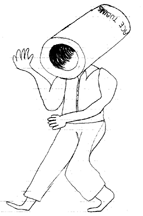
Jokes about the Tube and Tubeheads became a constant subject
of conversation. Anyone we deemed inferior, which was practically
everybody, we called a Tubehead. He drew a picture, called "The
March of the Tubeheads", of four men striding forward in
R. Crumb "trucking" style, with tall Tubes instead of
heads. He drew a similar picture on my table.
Richard was a man who looked to the Future. He often spoke
of his ideas for the Future. His concepts incorporated several
notions of the Future as it was envisioned in the past. It was
the streamlined dream of better living through machines that was
seen during the Depression, combined with the mass-marketed, kidney-shaped
life of convenience that came about in the Atomic Age, all tied
up with State of the Art electronics and his own peculiar concept
of Cool. He had visions of streamlined cars with enormous tailfins,
of futuristic cafes, with blue glass fixtures and espresso served
up from gleaming chrome machines, of neon landscapes and cities
populated by Young Ultra-Moderns. His ideas sounded wonderful.
He wrote a short story, about a place called
the Cafe Modern. Here is an excerpt: "The cafe was dim and
smoky at this hour, when the only white light was on the musicians,
and the Technicians [who were attired in black leather and white
lab coats], whose work at the gleaming espresso machines behind
the bar was illuminated by hooded chromium lamps. The great cobalt
glass windows filtered through only a blue glow reflected from
the buildings outside, punctuated only by the stray blue neon
sign. The blue Hubble-light ashtray units on the tables gave the
appearance of an airfield at night."
Rash's room reflected his interest in the Future. I thought
it was the coolest place in town. He kept it dimly lit, so that
the room had a dark tone, like being under water. The lamps lit
only certain areas, pools of light in the darkness. (The room
had a long line of flourescent tubes, but Rash never used these,
since he despised flourescent lights.) There were three lamps
that I was particularly enamored of: a lava lamp, a lamp in a
metal cylinder, which was touch activated, and the Martian.
 The Martian was a rounded Atomic Age reading
lamp that stood on a tall tripod, with a deep red, extremely concave
lens through which the light shone. Rash had constructed the Martian
himself, by fitting the lens into an existing lamp. The Martian
stood guard over Richard's stereo.
The Martian was a rounded Atomic Age reading
lamp that stood on a tall tripod, with a deep red, extremely concave
lens through which the light shone. Rash had constructed the Martian
himself, by fitting the lens into an existing lamp. The Martian
stood guard over Richard's stereo.
This lamp was called the Martian because it had a single, red
eye and stood on a tripod. The eye was red because Mars, and all
things Martian, is red, and it had three legs because according
to H.G. Wells and Robert Heinlein, Martians walk on three legs.
Over the mantle was his first crude piece of Neon. Later, he
would collect many beautiful Neon tubes, but his first was not
very impressive. It was part of an old beer sign: three parallel
orange lines, dim and flickering.
Richard's room was a fascinating place. I loved to spend time
there with him, though he often sent me away when he was busy
with some project. His room always smelled strongly of the freshly
roasted coffee beans. (It was equipped with a fire place, which
was where he did the roasting.)
And the music! Rash's taste in music also reflected his Futuristic
bent. The top radio hits were heavy metal noise and vanilla pop
rock. But in Richard's room, music was electronic. It was done
with machines and synthesizers and computers. Performers had names
like Synergy, Vangelis, Jean Michel Jarre, and Tomita. The music
had a pulsating, exciting, electric beat. It was scientific. It
was the Future. I loved it.
He tried to expose me to classical music, and to Jazz, and
to Frank Sinatra. But I wasn't interested in these things.
One night in the spring of that year it rained. It rained and
rained and rained. And the basement, location of Richard's room
of wonder, began to flood.
As the flood waters rose, it became clear that if something
was not done, Rash and all of his nifty belongings would be soaked.
He started building up little walls of rags and towels, and sandbags
of old newspapers, trying to make the rising water stay in other
parts of the basement. But these measures were insuffient. The
water kept coming in. Soon the whole family was involved.
On the far side of the basement, it was dry, because of the
drain that let water out. The water was collecting in pools too
far from this drain to escape. So we swept the water and bailed
the water and urged the water over to the drain. Progess was made,
but not fast enough. At last, two pieces of garden hose were brought
forth. By placing one end of a hose in the drain and the other
in the water, we were able to siphon the water away from Richard's
room.
For weeks afterwards, we referred to the ordeal as "The
Night of the Long Tubes".
As that year wore on, we began to talk in our own special language.
We spoke of the Tube, and of Tubeheads. We held combat over the
taking of the Daily Water, and the Drying Process. My name was
Antag, and his, Rash. When my friends and I got together, he called
us The Little Guys. We sang our Merry Tunes.
I was taking German in school, and since he had studied it,
too, we often spoke in that language. Or at least we tried to.
He had travelled in Germany, and was taking advanced courses in
the language at college. But I was in my first year. So it was
a psuedo German, espcially since Rash often made up German sounding
words. There was "Rohrkopf", the literal German translation
of "Tubehead", and the undefined but decidedly insulting
false German word, "Schtumpfen". Once he wrote on my
table, "Bist du ein Schtumpfen?", meaning "Are
you a Schtumpfen?"
One word we used a lot was "Lappish", which is a
real German word, meaning silly. When Rash thought something was
foolish, he would say "Lappish!" but he would stretch
out the L, so that it was "LLLLLLappish!" After a while,
he would just say "LLLLLLLL" and I would know what he
meant.
Another thing he did was to make this sound. He would suck
air into his mouth with a hissing noise, then clamp his lips shut
with a pop. It was a sort of "SHHHHUPH" sound. He made
this noise when he wanted to get my attention. Soon, I also started
to make the sound. It became a kind of greeting.
And Units! A Unit was a piece of chocolate. Just as gold was
the basis of value behind the dollar, chocolate was the commodity
of value that backed our own special currency, which we called
the Unit. Almost any kind of chocolate could be called a Unit,
as there was no precise definition of just how much chocolate
equalled one Unit. One favorite was the marble-sized
spheres of chocolate manufactured by Russell Stover Candies
at Christmas time, in the two-toned foil wrappers. (The wrappers
came in five color combinations: red and green, blue and yellow,
yellow and green, yellow and red, and yellow and magenta. The
blue and yellow ones were somehow more tasty than the others.)
But the very best Units of all were fudge, from the old family
recipe for Four Minute
Fudge, which we both cooked and ate frequently.
When you felt or inflicted physical pain, you had "Damaged
the Tissue." The word "Tissue" was not pronounced
in the usual way; the "s" letters were not given the
familar "sh" sound. Instead, it rhymed with "miss
you".
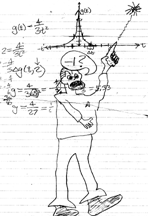 Rash would stomp upstairs to my room to see
me, making the "Shhupp" noise. We would laugh and talk
and hang out. My clothes would be lying about on the floor, and
he would kick them around and say "You'll never get into
the Academy with a messy room like this!" Sometimes, he'd
help me with my homework. I remember one time when he showed me
how to do a problem that I couldn't figure out. He went into great
detail. Eventually he concluded that the answer was 1/6. But then
we turned to the back of the book, to check his answer against
those provided. The book's answer was -1. In his irritation, he
drew a big picture over his calculations, of a "Star Trek"
crewman shooting his phaser into the air and shouting, enragedly,
"-1?". I still have that picture.
Rash would stomp upstairs to my room to see
me, making the "Shhupp" noise. We would laugh and talk
and hang out. My clothes would be lying about on the floor, and
he would kick them around and say "You'll never get into
the Academy with a messy room like this!" Sometimes, he'd
help me with my homework. I remember one time when he showed me
how to do a problem that I couldn't figure out. He went into great
detail. Eventually he concluded that the answer was 1/6. But then
we turned to the back of the book, to check his answer against
those provided. The book's answer was -1. In his irritation, he
drew a big picture over his calculations, of a "Star Trek"
crewman shooting his phaser into the air and shouting, enragedly,
"-1?". I still have that picture.
Rash would often demand "tribute". Tribute was payment
of some kind that he felt was automatically due to him, just as
The Pound of Flesh was rendered unto Caeser. "You must render
Tribute," he would say. I never gave him any Tribute, but
he often demanded it.
Then there were the Schlager battles. A Schlager was a shaft
of wood, about two feet long. The name is another German word,
from the verb "Schlag", to strike. He'd learned about
this in his Germanic studies, and in his fencing class. German
students dueled with short swords called "Schlagers",
which is how they got those fashionable dueling scars. But we
used these thick wooden rods, like in a movie he'd seen once.
We'd stand in the basement or in the back yard, and duel with
these sticks. The idea was really just to hit the other guy's
Schlager, but the battles usually ended with one or the other
of us having his thumb smashed. Usually it was Rash. He eventually
refused to continue this sport, until we could obtain some steel
gloves. We never did.
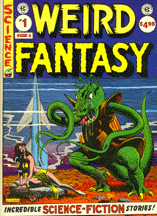 Sometimes Rash loaned me comic
books to read. He had a library of reprints of the old EC "Weird Science" and
"Weird Fantasy" comic books. These comics came out in
the 50's and were later banned because so many parents objected
to having their children read them. They were shocking and graphic,
but also thrilling, thought provoking, imaginative, well written,
and extremely well drawn.
Sometimes Rash loaned me comic
books to read. He had a library of reprints of the old EC "Weird Science" and
"Weird Fantasy" comic books. These comics came out in
the 50's and were later banned because so many parents objected
to having their children read them. They were shocking and graphic,
but also thrilling, thought provoking, imaginative, well written,
and extremely well drawn.
He also had a full collection of "The Silver Surfer"
comics, and a large number of very old "Fantastic Four"
books, in which the Surfer was orignially introduced.
The Silver Surfer was the ultimate superhero of the 1960's.
He was a spaceman with gleaming silver skin, who rode a surfboard
through the cosmos. He was Cool.
Among the many lessons Rash taught me, the most important one
was, I think, being cool. Cool is a whole way of life, a whole
way of thinking. "Everyone is a jerk when they are born,"
said Rash. "To be cool is to learn to leave the jerk at home."
Being cool is being relaxed and in control in any situation. It
is a code of ethics, with rules of comportment and behavior and
manners. It is looking good at all times. If Rash ever called
me uncool, it was a burning insult, a failing grade on an exam
of life. Being called a Tubehead was really just a joke, an insult
cast in good clean fun. Being told I was uncool meant a serious
error on my part.
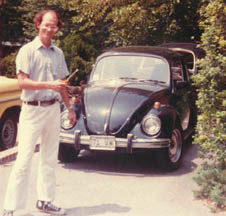 Eventually, those golden days passed on. Rash
graduated, found a good job, and moved back out. I was sad to
see him go, but he was not gone, not really. He dropped in often.
He would sometimes hang around all day of a summer Saturday, working
on his car. He would leave notes for me on my desk if I wasn't
around when he stopped in.
Eventually, those golden days passed on. Rash
graduated, found a good job, and moved back out. I was sad to
see him go, but he was not gone, not really. He dropped in often.
He would sometimes hang around all day of a summer Saturday, working
on his car. He would leave notes for me on my desk if I wasn't
around when he stopped in.
We remain very close. We still joke and laugh and speak our
own language. Rash lives in California now. I miss him, and hated
to see him leave. But I remember once, before he left, he said
to me, "I can go now; your training is almost complete."
"Almost?" I said. "When will it be complete?"
"Well," he said, "It will never really be complete.
One is always learning. But I've taught you all I can. That's
partly why I've stuck around this town so long. The rest is up
to you."
I wasn't a Little Guy anymore.

Copyright © 1987 by Andrew
Looney.
 Rash had this alien machine. It was about
a foot tall, and sat on a burner on the top of the stove. It was
painted brown, and was curved and rounded, with several knobs
and levers. He used it to make espresso. The brand name of the
machine, written on a small disk set into the top of the thing,
was "Atomic".
Rash had this alien machine. It was about
a foot tall, and sat on a burner on the top of the stove. It was
painted brown, and was curved and rounded, with several knobs
and levers. He used it to make espresso. The brand name of the
machine, written on a small disk set into the top of the thing,
was "Atomic".
 No talking was permitted during Rod Serling's
black and white half hour, at least when it was a good episode.
But some of the shows have not aged well at all, and some were
bad to begin with; in either of these cases laughter and heckling
were allowed.
No talking was permitted during Rod Serling's
black and white half hour, at least when it was a good episode.
But some of the shows have not aged well at all, and some were
bad to begin with; in either of these cases laughter and heckling
were allowed.
 The Martian was a rounded Atomic Age reading
lamp that stood on a tall tripod, with a deep red, extremely concave
lens through which the light shone. Rash had constructed the Martian
himself, by fitting the lens into an existing lamp. The Martian
stood guard over Richard's stereo.
The Martian was a rounded Atomic Age reading
lamp that stood on a tall tripod, with a deep red, extremely concave
lens through which the light shone. Rash had constructed the Martian
himself, by fitting the lens into an existing lamp. The Martian
stood guard over Richard's stereo. Rash would stomp upstairs to my room to see
me, making the "Shhupp" noise. We would laugh and talk
and hang out. My clothes would be lying about on the floor, and
he would kick them around and say "You'll never get into
the Academy with a messy room like this!" Sometimes, he'd
help me with my homework. I remember one time when he showed me
how to do a problem that I couldn't figure out. He went into great
detail. Eventually he concluded that the answer was 1/6. But then
we turned to the back of the book, to check his answer against
those provided. The book's answer was -1. In his irritation, he
drew a big picture over his calculations, of a "Star Trek"
crewman shooting his phaser into the air and shouting, enragedly,
"-1?". I still have that picture.
Rash would stomp upstairs to my room to see
me, making the "Shhupp" noise. We would laugh and talk
and hang out. My clothes would be lying about on the floor, and
he would kick them around and say "You'll never get into
the Academy with a messy room like this!" Sometimes, he'd
help me with my homework. I remember one time when he showed me
how to do a problem that I couldn't figure out. He went into great
detail. Eventually he concluded that the answer was 1/6. But then
we turned to the back of the book, to check his answer against
those provided. The book's answer was -1. In his irritation, he
drew a big picture over his calculations, of a "Star Trek"
crewman shooting his phaser into the air and shouting, enragedly,
"-1?". I still have that picture. Sometimes Rash loaned me comic
books to read. He had a library of reprints of the old
Sometimes Rash loaned me comic
books to read. He had a library of reprints of the old  Eventually, those golden days passed on. Rash
graduated, found a good job, and moved back out. I was sad to
see him go, but he was not gone, not really. He dropped in often.
He would sometimes hang around all day of a summer Saturday, working
on his car. He would leave notes for me on my desk if I wasn't
around when he stopped in.
Eventually, those golden days passed on. Rash
graduated, found a good job, and moved back out. I was sad to
see him go, but he was not gone, not really. He dropped in often.
He would sometimes hang around all day of a summer Saturday, working
on his car. He would leave notes for me on my desk if I wasn't
around when he stopped in.




